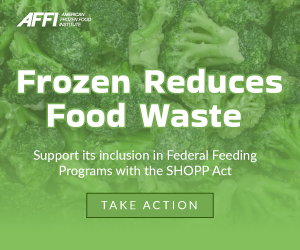Arlington, Va. – While the origin of a cluster of coronavirus infections in Beijing, China, is unknown, some officials are suggesting the virus was present on chopping boards used to cut imported salmon. The speculation is also drawing a misleading conclusion that frozen foods can contribute to the spread of coronavirus. As the leading association representing the U.S. frozen food industry, the American Frozen Food Institute (AFFI) is providing information on what we currently know regarding the science and spread of coronavirus.
“The overwhelming scientific consensus is that SARS-CoV-2, unlike norovirus and hepatitis A, is not transmitted by the consumption of potentially contaminated foods. The virus is unlikely to be in food, but even if it were, SARS-CoV-2 is transmitted by respiratory, not gastrointestinal routes,” said former NoroCORE™ Scientific Director and top food virologist Dr. Lee-Ann Jaykus. “While we do freeze viruses to store them, there is no science that points to the link between surface contamination of food and the contraction of COVID-19.”
“While SARS-CoV-2 has been recovered from surfaces, particularly those in health care settings, the risk of contracting COVID-19 from these surfaces is likely quite low. This is especially the case when food handlers use proper sanitation and hand hygiene,” said AFFI food safety expert Dr. Donna Garren. “This is a good reminder, as more people are preparing food at home right now, to follow the Partnership for Food Safety Education’s basics of safe food handling: clean, separate, cook and chill.”
In addition, AFFI also states:
- The U.S. food supply remains among the safest in the world. There is no evidence for the spread of SARS-CoV-2 through consumption of food or no known cases of foodborne COVID-19. According to multiple public health agencies around the world, including the S. Department of Agriculture (USDA), U.S. Food and Drug Administration (FDA), U.S. Centers for Disease Control and Prevention (CDC), World Health Organization (WHO), and European Food Safety Authority (EFSA), coronaviruses are primarily spread from person-to-person through respiratory droplets and aerosols.
- While many viruses can survive freezing temperatures, SARS-CoV-2 does not cause foodborne illness. Like other viruses, surfaces can become contaminated with SARS-CoV-2 by contact with an infected person. To counteract this possibility, a two-pronged control approach is used: frequent and proper hand washing, and surface disinfection. These measures are recommended by the CDC and remain important steps to prevent exposure.
- The frozen food industry’s top priority today and every day is food safety. As a preventative measure, frozen food companies are increasing the rigor of their sanitation and hygiene practices and instituting many other strategies to prevent disease transmission amongst their essential workforce. These measures are beyond what is required by law or regulatory guidance during this pandemic.
The American Frozen Food Institute is the member-driven national trade association that advances the interests of all segments of the frozen food and beverage industry. AFFI works to advance food safety and advocates before legislative and regulatory entities on the industry’s behalf to create an environment where members’ foods and beverages are proudly chosen to meet the needs of a changing world.




